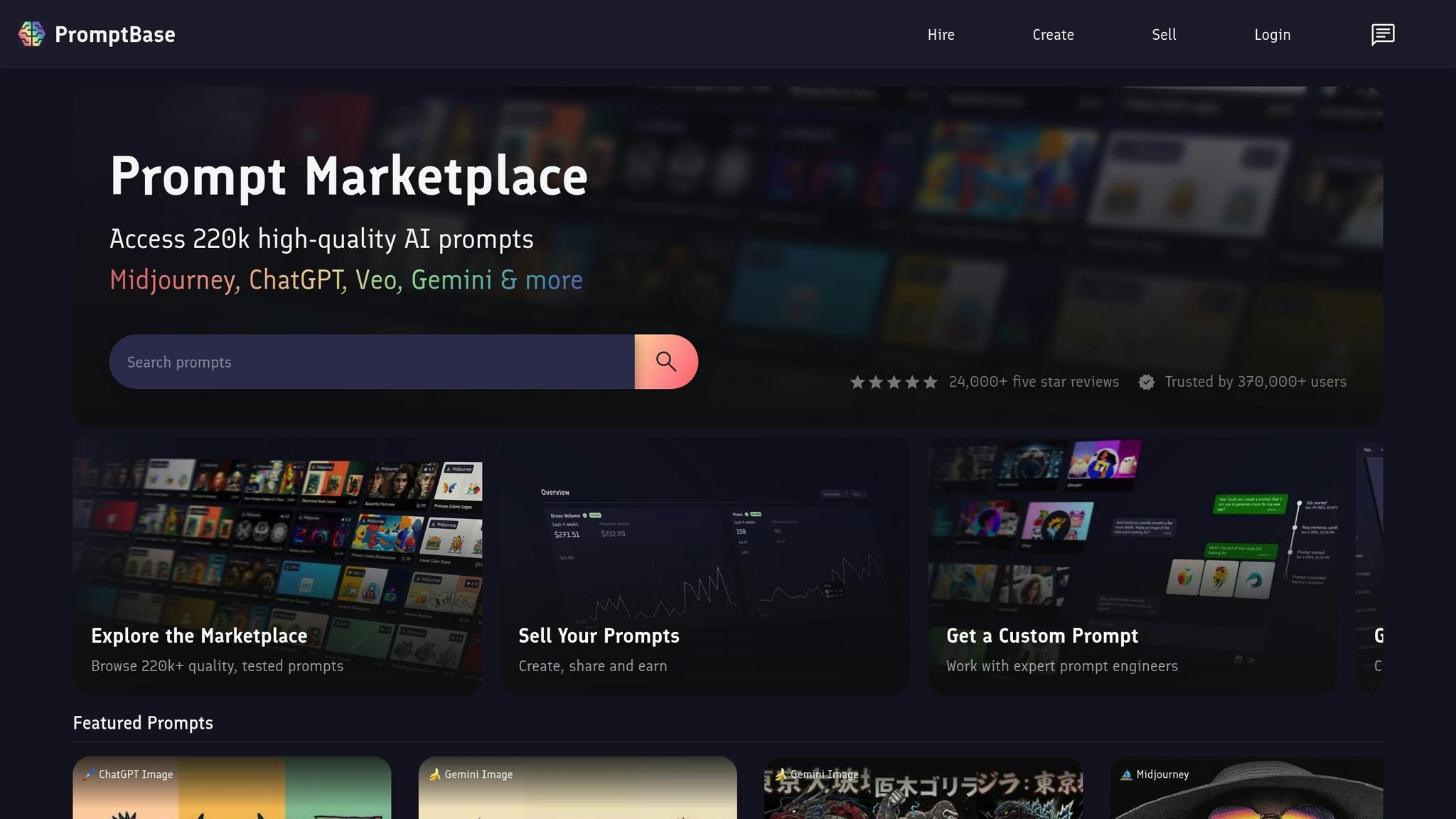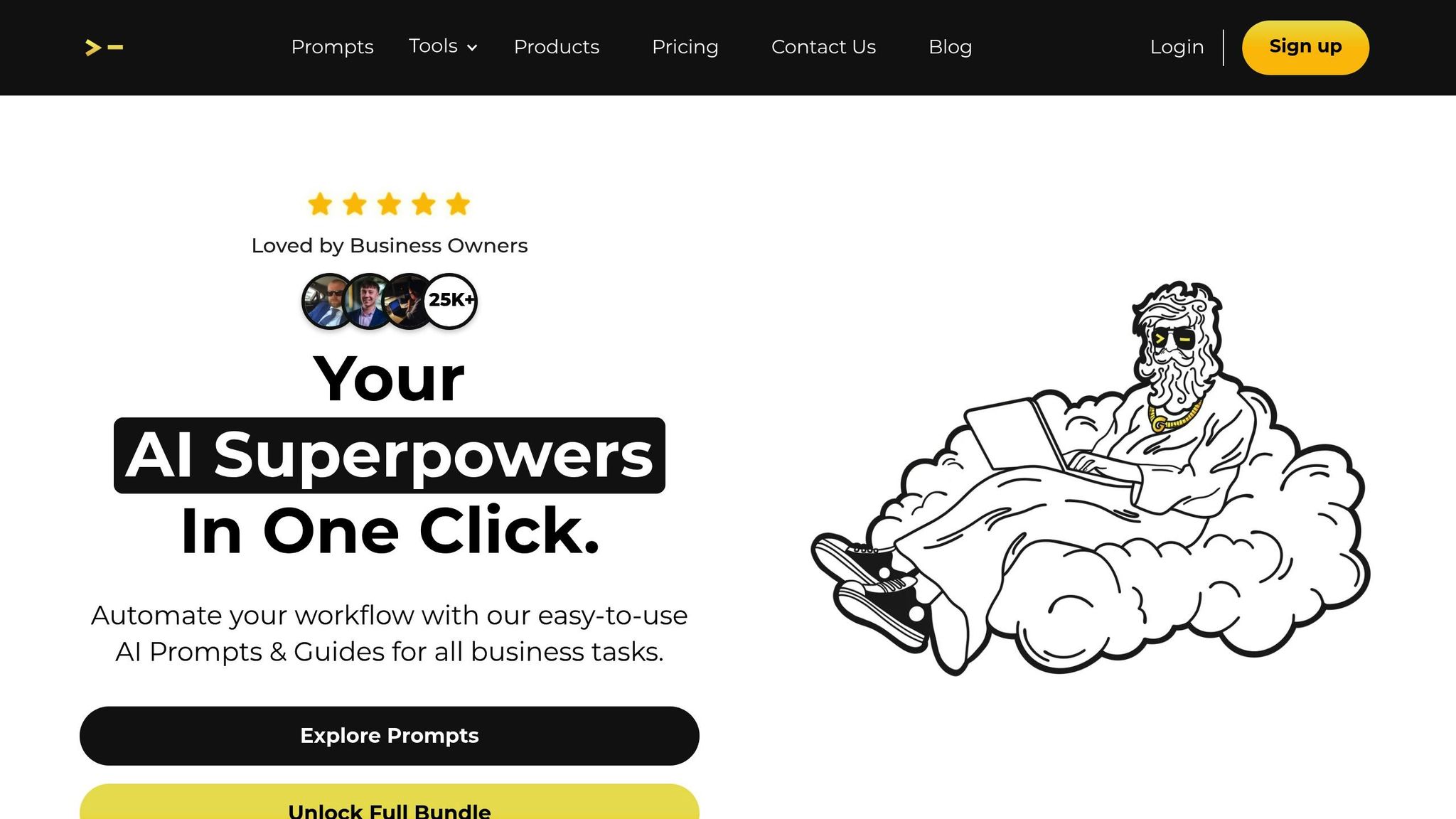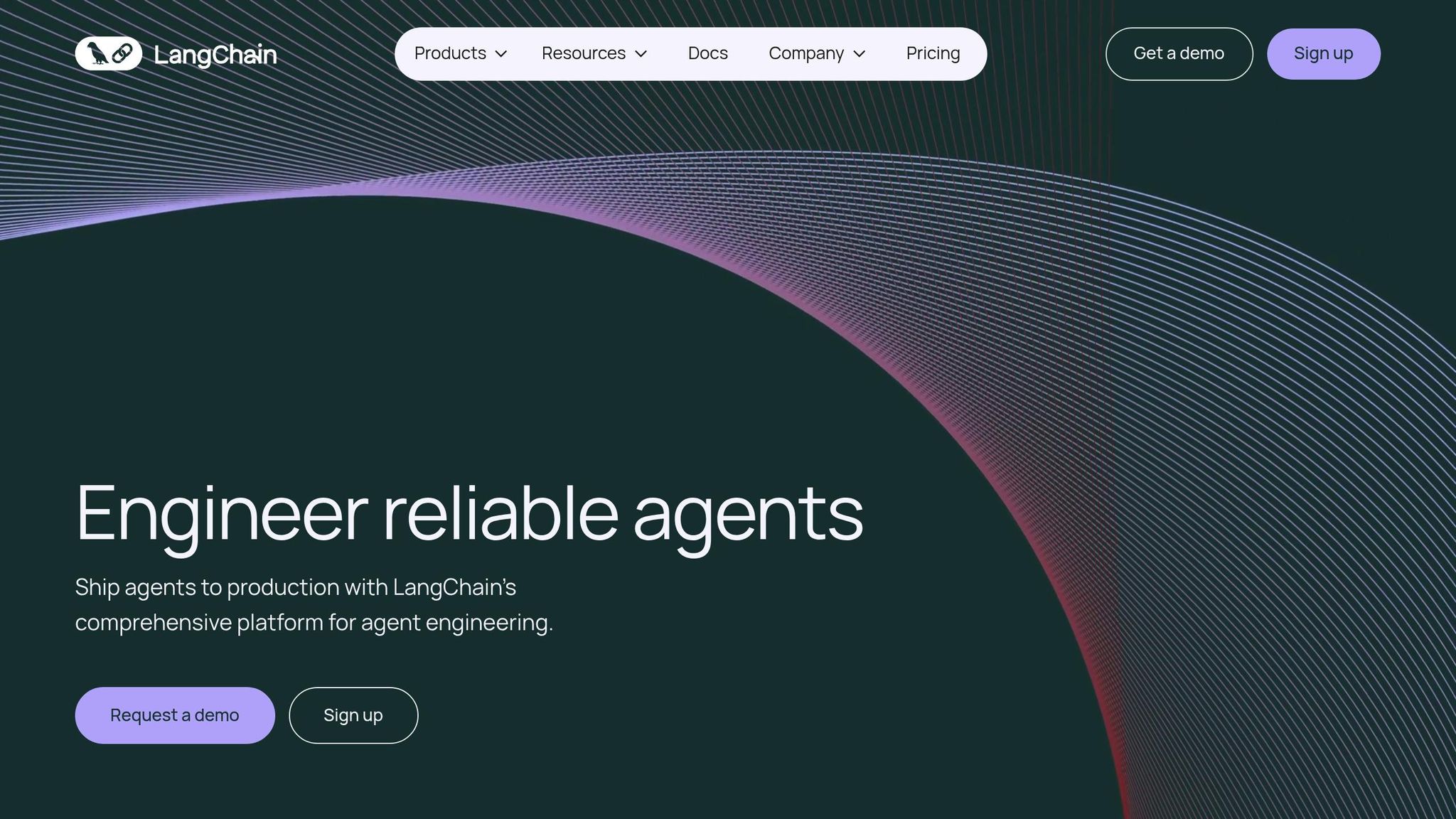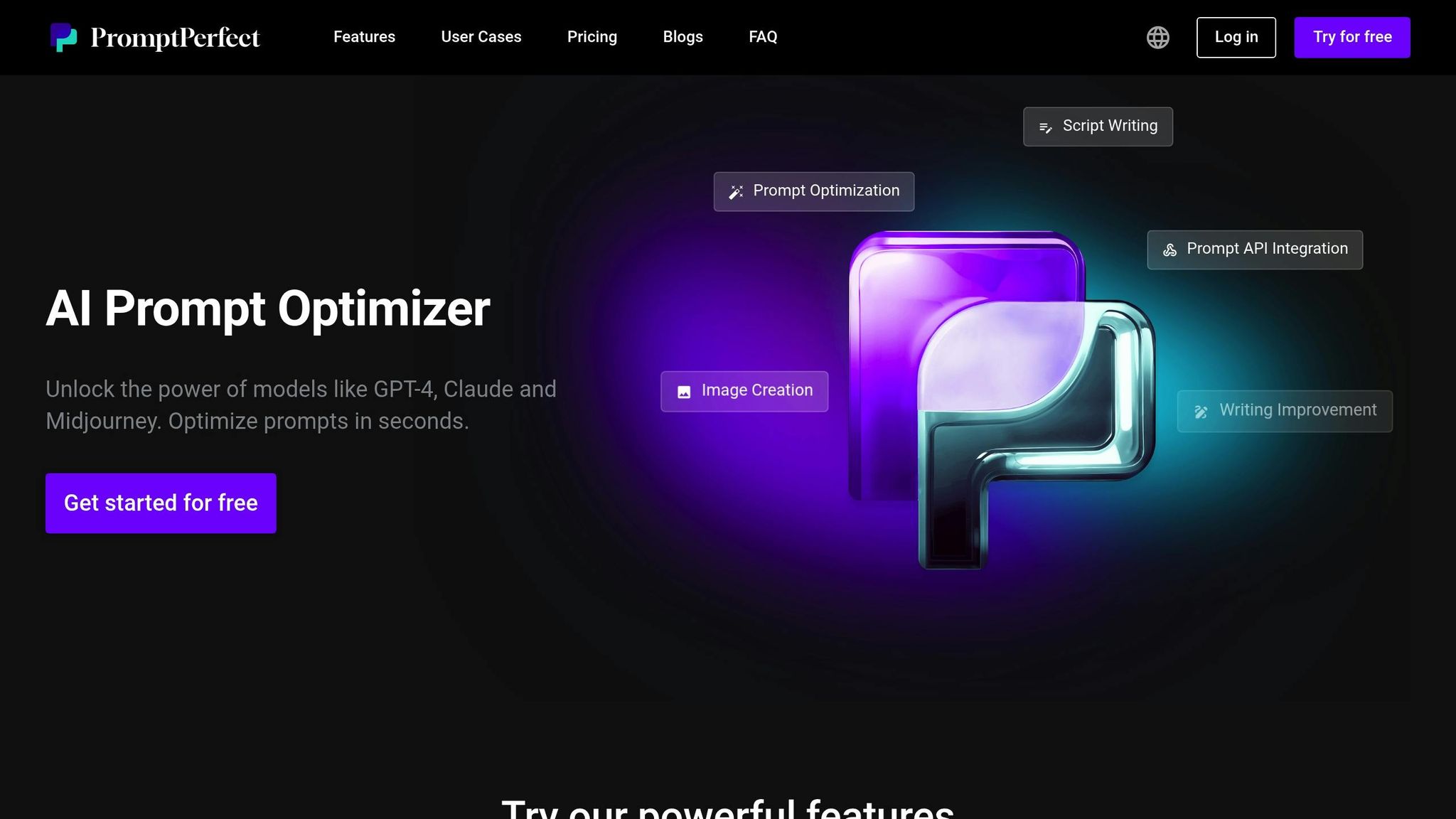
If you're looking for tools to improve how you use AI models like ChatGPT, Claude, or Gemini, prompt libraries can save you time and effort. These libraries provide pre-tested prompts that work across multiple platforms, helping businesses and individuals get consistent, high-quality results without starting from scratch every time.
Here’s a quick breakdown of five popular options:
Key takeaway: For simplicity and cost-effectiveness, the God of Prompt library is a strong choice for businesses and professionals. Developers with technical needs might prefer LangChain, while teams managing shared workflows could benefit from PromptHub.
Quick Comparison Table
| Platform | Supported AI Models | Key Features | Pricing (USD) | Best For |
|---|---|---|---|---|
| God of Prompt | ChatGPT, Claude, Midjourney | 30,000+ prompts, lifetime updates | $0-$150 (one-time) | Small businesses, marketers |
| LangChain | Multiple | Open-source, custom integrations | Free core; $39+ | Developers, technical teams |
| PromptBase | ChatGPT, DALL-E, Midjourney | Marketplace for buying/selling prompts | $2.99-$6.99/prompt | Specific-use cases, creatives |
| PromptHub | Multiple | Collaboration tools, version control | $12+/month | Teams, enterprises |
| PromptPerfect | Various | Automated prompt optimization | Unknown | Performance-focused users |
Choose based on your goals, technical expertise, and budget.


God of Prompt offers a massive collection of over 30,000 AI prompts designed for business professionals. The platform simplifies the process for entrepreneurs by providing prompts that work seamlessly across multiple AI models, so there's no need to reconfigure prompts for each system.
God of Prompt is compatible with all major AI platforms, including ChatGPT, Claude, Midjourney, Gemini AI, Bard, and Bing AI. By tailoring prompts to each model, the platform ensures smooth functionality - whether you're using ChatGPT for content creation or Claude for data-driven tasks.
Prompts are grouped into bundles based on categories like business, marketing, SEO, and productivity, with concise guides to help users get started. Access is flexible, with prompts available through a dedicated library interface or via Notion for easy organization and retrieval.
The platform also includes a custom GPT toolkit and offers unlimited prompt generation for premium users. All plans come with lifetime updates, ensuring the prompt library stays relevant as AI capabilities evolve and new models are introduced.
God of Prompt operates on a one-time payment model, offering lifetime access - a cost-effective choice for US businesses looking to avoid ongoing subscription fees. Here's a breakdown of the pricing:
These pricing options provide flexibility for businesses of all sizes and needs.
God of Prompt is particularly effective for business automation, ensuring high-quality output across various AI models. Marketing teams use its SEO and content prompts to maintain a consistent brand voice, whether they're creating blog posts with ChatGPT or analyzing data with Claude.
E-commerce businesses benefit from its product description and marketing copy prompts, which can be customized for different AI models. Midjourney prompts are especially useful for generating cohesive visual branding, while ChatGPT and Claude excel at written content.
For solopreneurs and consultants, the platform's productivity and business development prompts are a game-changer. They allow users to switch between AI models based on cost or specific strengths, all without disrupting their workflow.

LangChain is an open-source framework designed to help developers create applications powered by large language models. It’s particularly useful for businesses looking to implement advanced AI capabilities into their operations.
LangChain supports a wide range of AI models, including OpenAI's GPT models, Anthropic's Claude, Google's Gemini, and several others. Thanks to its modular design, developers can easily switch between these providers, making it a great option for businesses aiming to avoid being tied to a single vendor. This flexibility also allows companies to manage costs by using different models for specific tasks.
In addition to general-purpose models, LangChain integrates with specialized models tailored to tasks like semantic search or code generation. This means businesses can build applications that combine the strengths of various AI systems, all within a single framework. The result? A highly versatile and powerful toolset.
LangChain provides a comprehensive set of tools for businesses looking to integrate AI into their workflows. From chains and agents to memory systems, it enables developers to create end-to-end workflows. Built-in tools like document loaders, text splitters, and vector storage make it easy to process and query data. This is especially useful for building retrieval-augmented generation (RAG) systems, which allow businesses to interact with their own datasets efficiently.
The platform also includes LangSmith, a commercial product designed for production environments. LangSmith offers features like observability, evaluation, and deployment, giving developers insights into how their workflows perform. With detailed traceability, businesses can identify and resolve issues in complex processes.
For those creating customer-facing AI applications, LangChain’s agent capabilities allow the development of systems that can autonomously use tools, make decisions, and handle multi-step processes. Extensive documentation and a wealth of community examples make it easier to implement these advanced features.
LangChain follows a freemium model, giving businesses access to the core framework for free. Advanced features, available through LangSmith, require a paid subscription. This model allows companies to experiment and scale their solutions without a hefty upfront investment.
The primary costs associated with LangChain come from the AI model APIs and the infrastructure businesses use for deployment.
Here’s a breakdown of LangSmith pricing tiers:
Additional trace usage costs $0.50 per 1,000 base traces (14-day retention) or $5.00 per 1,000 extended traces (400-day retention). The free tier is an excellent starting point for businesses exploring LangChain’s capabilities.
LangChain’s flexibility and robust features make it a go-to solution for a variety of applications.
In financial services, companies use LangChain to build systems that analyze contracts, compliance documents, and financial reports. By leveraging multiple AI models, these systems can handle different types of analysis within a single workflow.
E-commerce platforms use LangChain to enhance customer service. These AI-driven systems can access product databases, manage returns, and even escalate complex issues to human agents when necessary. With conversational memory, they can handle multi-turn interactions, making customer support feel more natural and effective.
For software development teams, LangChain simplifies internal processes. Developers use it to analyze codebases, generate documentation, and assist with code reviews. Its seamless integration with existing workflows and version control systems ensures that AI tools become a natural extension of the development process.
When it comes to managing large document repositories, LangChain’s RAG capabilities shine. Businesses can build intelligent search and question-answering systems that provide accurate, source-cited answers from knowledge bases, legal documents, or technical manuals. This makes it a valuable tool for industries that rely on quick and reliable access to information.
PromptBase is an online marketplace where users can buy and sell AI-generated prompts. With over 220,000 prompts available, it serves as a go-to resource for those seeking ready-made solutions tailored to various AI models and applications.
PromptBase supports a wide range of AI tools, making it suitable for different tasks. For text generation, it includes models like ChatGPT, Gemini, Claude, DeepSeek, GPT-4o, Grok, and Llama. In image generation, it works with Midjourney, ChatGPT Image, Gemini Image, DALL·E, Ideogram, Imagen, Leonardo AI, Stable Diffusion, and Grok Image. When it comes to video content creation, the platform supports Veo, Sora, Midjourney Video, KLING AI, Seedance, and Seedream.
One of PromptBase's key strengths is its organization. Prompts are categorized by AI model, making it easy for users to find ones that align with the strengths of specific tools.
PromptBase offers more than just a massive library of prompts. Its marketplace structure allows users to browse, purchase, and even sell prompts. For those in need of tailored solutions, expert prompt engineers can be hired to create custom prompts. Additionally, the platform includes an AI app builder, which transforms purchased prompts into interactive applications.
To make navigation simple, users can filter content by AI model, product type (such as prompts, bundles, or apps), price range, and category. Prompts are also organized by output type - whether it's for generating text, images, or videos.
PromptBase uses a pay-per-prompt pricing model, offering flexibility for users with different needs. Prices range from $2.99 to $6.99, depending on the complexity of the prompt. Simpler prompts are priced on the lower end, while specialized ones cost more. For businesses needing multiple prompts, bundled options can provide better value.

PromptHub stands out by emphasizing cross-model compatibility while introducing features tailored for collaboration. It's designed for both teams and individuals who want to organize, improve, and share prompts across multiple AI models. With a focus on prompt management and teamwork, it’s an excellent choice for organizations working on refining their prompts internally.
PromptHub connects seamlessly with major AI providers through API integration. It supports popular text generation models like ChatGPT, Claude, and Gemini, alongside other large language model (LLM) providers. Users bring their own API keys, giving them full control over token costs. This smooth integration makes collaboration straightforward and efficient, as highlighted below.
PromptHub allows users to create both public and private prompt libraries, complete with advanced search and categorization tools to make locating and reusing prompts easier. A built-in enhancement tool helps refine prompts for better performance across multiple models.
The platform also includes a playground where users can test prompts in real time before deploying them. API access enables developers to integrate their prompt libraries directly into workflows and applications. For teams, advanced permissions allow admins to control who can view, edit, or share prompts, ensuring consistent performance across platforms.
PromptHub offers a tiered subscription system to accommodate teams of all sizes:

PromptPerfect focuses on refining prompt performance for various AI models through automated optimization and performance analysis. Its approach involves tailoring prompts to meet the specific needs of each model. However, beyond this, there’s limited publicly available information about the platform. Details such as the supported AI models, specific features, pricing, or real-world applications remain unclear. This lack of information leaves room for further exploration of its potential strengths and limitations.
Each prompt library comes with its own set of strengths and limitations. Understanding these trade-offs can help you choose the right platform to meet your business goals.
God of Prompt stands out with its massive library of over 30,000 prompts, covering AI models like ChatGPT, Claude, Midjourney, and Gemini. Its extensive categorization system - spanning business, marketing, SEO, and productivity - makes it highly versatile. Plus, the lifetime updates policy ensures ongoing access without recurring fees. However, the premium Complete AI Bundle, priced at $150, requires a higher upfront investment.
LangChain is tailored for developers and technical teams, offering unmatched flexibility and customization. Its open-source nature supports seamless integration into existing workflows and allows users to adapt it extensively. With support for numerous AI models and detailed documentation, it’s a go-to for building custom AI applications. That said, its complexity might be a hurdle for non-technical users.
PromptBase operates as a marketplace where users can buy community-created prompts for various AI platforms. This model brings diverse perspectives and specialized prompts from different creators. The pay-per-prompt system is budget-friendly for occasional users, but for heavy users, costs can quickly add up. Additionally, the quality of prompts depends on the creator, which can vary significantly.
PromptHub emphasizes team collaboration, making it ideal for organizations looking to standardize and manage prompts. It supports version control for prompt iterations and provides analytics to track performance. While its collaborative features shine in team settings, it may not appeal as much to solo professionals or small teams due to its focus on enterprise-level environments.
The table below highlights the core features and best use cases of these platforms, offering a quick comparison to help guide your decision.
| Platform | Supported AI Models | Key Features | Pricing (USD) | Best Use Cases |
|---|---|---|---|---|
| God of Prompt | ChatGPT, Claude, Midjourney, Gemini | 30,000+ prompts, lifetime updates, categorized bundles | $0-$150 (one-time) | Business professionals, marketers, content creators |
| LangChain | Multiple (extensive) | Open-source, custom integrations, developer tools | Free (open-source) | Developers, technical teams, custom applications |
| PromptBase | ChatGPT, DALL-E, Midjourney, Stable Diffusion | Marketplace model, community-created prompts | Variable per prompt | Specific prompt needs, creative projects |
| PromptHub | Multiple | Team collaboration, version control, analytics | Subscription-based | Enterprise teams, collaborative environments |
| PromptPerfect | Various (limited info) | Automated optimization, performance analysis | Unknown | Performance-focused applications |
When considering additional factors, God of Prompt offers a predictable one-time cost and minimal technical setup, making it accessible for a wide audience. LangChain provides unlimited scalability for custom projects but demands technical expertise. PromptBase is flexible with its pay-per-use model, though quality can vary. Meanwhile, PromptHub excels in collaborative settings with its subscription-based structure. For businesses looking to scale, God of Prompt’s extensive library supports a variety of AI models without extra costs, LangChain offers boundless customization, and PromptBase and PromptHub adapt based on budget and team size.
Based on the analysis above, here are some practical suggestions for professionals in the US.
When selecting a prompt library, it’s important to consider your business goals, technical know-how, and budget. For those seeking an affordable yet comprehensive solution, the God of Prompt's Complete AI Bundle offers a compelling option at a one-time cost of $150. With access to over 30,000 AI prompts tailored for tools like ChatGPT, Claude, Midjourney, and Gemini, this bundle eliminates recurring subscription fees - a major plus for small and medium-sized businesses working within tight financial constraints.
Additionally, the 7-day money-back guarantee provides peace of mind, giving you a chance to explore the library and ensure it meets your needs before fully committing. This combination of affordability and flexibility makes it a strong contender among the options reviewed.
When deciding on a prompt library, take into account your team size, their technical expertise, and your organization’s long-term AI goals. A well-chosen library can significantly enhance productivity and ensure consistent, high-quality AI-generated outputs across your projects.
God of Prompt makes sure its prompt libraries work seamlessly with multiple AI models by providing tools designed for cross-platform compatibility. This means users can create and fine-tune prompts for systems like ChatGPT, Claude, and Gemini - all without needing different solutions for each platform.
By prioritizing flexibility and efficiency, God of Prompt helps teams and professionals simplify their workflows and boost productivity, no matter which AI model they choose. This broad compatibility ensures results are tailored to meet a variety of needs.
When selecting a prompt library to boost business efficiency, there are a few things to keep in mind. First, consider the size of the library, its user-friendliness, and how easily your team can access it. A good library should be straightforward to navigate, allowing for quick searches and smooth integration into your daily processes.
It's also important to focus on security and control features to safeguard sensitive data. Opt for tools that encourage team collaboration while keeping everything well-organized. This makes it easier to manage and deploy prompts effectively across different AI models.
The pricing approach of God of Prompt is designed to deliver both affordability and long-term benefits, making it a smart option for professionals and businesses aiming to get the most from their AI tools. By providing adaptable, high-quality prompts that work seamlessly with multiple AI models, it ensures you can optimize your AI usage without stretching your budget.
Though no direct comparisons to other providers are mentioned, God of Prompt emphasizes delivering great value through competitive pricing, comprehensive features, and practical applications that cater to a range of professional needs. This makes it a dependable choice for those looking for a scalable and efficient AI solution.





